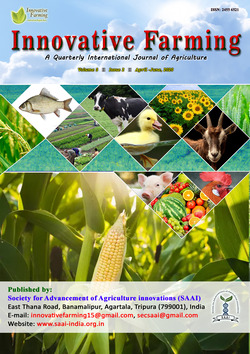
Rodent Damages and Approaches for their Management
Mariadoss A.*
National Institute of Plant Health Management (NIPHM), Ministry of Agriculture & Farmers Welfare, Govt. of India, Rajendranagar, Hyderabad - 500 030, INDIA
J. Alice
National Institute of Plant Health Management (NIPHM), Ministry of Agriculture & Farmers Welfare, Govt. of India, Rajendranagar, Hyderabad - 500 030, INDIA
A. Chakraborty
Krishi Vigyan Kendra, Khowai, Tripura - 799207, INDIA
DOI: NIL
Keywords: Behaviour, Damages, Management, Rodents
Abstract
Rodents are major vertebrate pests belongs to order Rodentia and class Mammalia. About 40% of all mammal species are rodents (2,277 species).They have emerged as a major pest due to their high damage potential and tendency to damage major crops at field level and in storage in India. Analysis of the reviews on pre-harvest losses indicates a range of 5-15% damage to major cereal crops and higher damages are noticed in endemic areas. Also about 2.5% damage is caused by rodents in post- harvest system. Rodents also gained importance due to their outbreaks in endemic areas and potential vector to cause and transmit zoonotic diseases such as plague and leptospirosis. The lesser bandicoot, Bandicota bengalensis, is predominant in irrigated crops throughout the country. The Indiang erbil, Tetara indica, soft-furred field rat, Millardia meltada, and field mouse, Mus booduga, are widespread in both irrigated dryland and dryland crops in the country, except in the north-eastern states. Farmers are facing huge problems due to rodent damage to their agricultural and horticultural crops for food and hoarding. The use of rodenticides is the common approach to manage rodent menace, but rodenticide coupled with many cultural practices like clean cultivation, proper soil tillage and crop scheduling, had given long-lasting results. Currently, problems occur due to increased intensive cropping with expansion of irrigated areas, changing agricultural practices resulting in higher breeding and damages by lesser bandicoot rats, increased coconut cultivation without proper spacing, cultivation of oilpalm in rodent-endemic areas, and natural calamities like flash floods and drought spells followed by heavy rains etc. Integrated rodent management is the available option to manage rodent damages.
Downloads
not found
